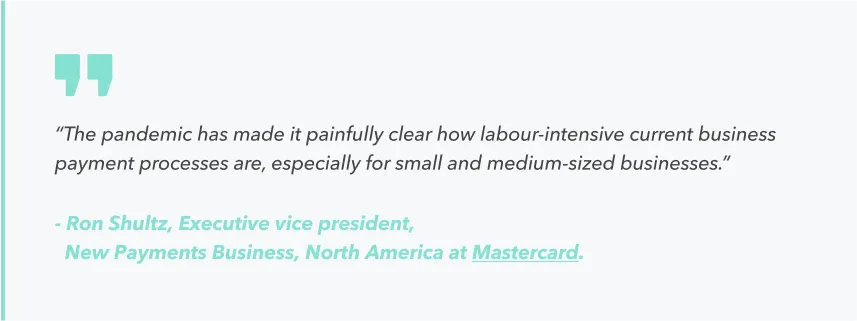Summary
If you haven't made the switch to company cards for business-related payments, you’re missing out on many benefits like easier tracking and cashback deals.
But not all company cards offer the same benefits, and some have a few drawbacks.
Let’s dive into more detail.
1. What are company cards?
2. Reasons to use company cards
3. Precautions with company cards
4. How to get company cards?
5. Types of company cards
6. How to choose the right card?
What are company cards?
Company cards are payment cards employees can use to pay for approved business-related expenses.
There are different kinds of company cards, such as corporate credit cards, virtual cards, debit cards and prepaid cards. The cards give you more speed, security, and detailed expense tracking no matter the type you choose.

Reasons to use company cards
Company cards remove the burden of upfront payments from your employees. Hence, it’s more convenient for them to make business transactions, and they’ll be less likely to miss payment deadlines.
These two simple changes result in smoother business operations and better relationships with your vendors.
Here are four more reasons to get company cards.
1. Extend payment terms
Suppliers usually have payment terms between 30 and 60 days. As a start-up, this can be tight, but you mostly don’t have the leverage to negotiate more favourable terms.
With a business credit card, however, you’ll be able to make payments to suppliers within the given terms and have an extra 55 interest-free days to pay your credit card bill. This approach helps you build trust with your business partners while maximising cash flow. (Note: this benefit is limited to credit cards.)
2. Retire inefficient financial processes
If purchase orders are still a part of your procurement process, you’ll know that the approval usually takes longer than it should, and the administrative workload can get overwhelming. Company cards fix this to help your business optimise time and productivity.
In addition, company cards replace physical claims, helping to reconcile all spending on a central dashboard. This reduces the chances of receipt forgery and optimises business spending insights.
Finally, most company cards come with a rewards program that offers discounts and rebates based on card spending.
3. Track and control spending
When you use a company card for all business spending, you’ll have complete visibility on transactions.
The time spent organising different modes of payment such as physical receipts, cheques or screengrabs of bank transfers will be significantly reduced.
Moreover, digital transaction data significantly reduces the number of discrepancies due to human error.
You can also use spending reports to get a deeper understanding of your company’s types of expenses. This can help you spend and budget more strategically to reduce costs.
4. Reduce vulnerability to fraud
Forged receipts and invoices remain a risk across all businesses.
With company cards, business owners can apply strict spending limits. They can even restrict usage to one-off transactions or merchant-specific expenditure. Moreover, companies can trace transactions in real-time and minimise attempts of fraud.
Precautions with company cards
It’s crucial to present rules for company card usage in an easily-accessible form for reference. Here’s a template to get you started.
Some standard rules include adhering to spend limits, charging only approved expenses, and keeping personal costs separate.
Business owners must also remind employees to take care of their cards to avoid any hassle with reporting and cancelling lost cards.
When introducing company cards to your team, appoint a person or department to manage all card-related training and queries. Doing so will accelerate the use of company cards and free up time for more important matters.
How to get a company card?
The most common way to apply for a company card, whether it be a credit, debit or prepaid card, is through a traditional bank. These banks mostly require applicants to fill out an online form with their basic company information. Then they assign a representative to contact you and guide you through the application process.
If you apply for a debit card, you’ll need to open an account with your chosen bank, as payments will be deducted directly from the account. But with some credit cards and prepaid cards, you are not required to open an account with the bank.
An alternative way to apply for a company card is through payment service providers like Aspire. For example, Aspire's virtual cards give employees the convenience of debit card spending along with a real-time view of all the card's transactions. It takes less than five minutes to apply for a virtual card, and you can order as many as you need at no additional cost.
Types of company cards
There are five main types of cards: corporate cards, business cards, virtual cards, debit cards and prepaid cards. Virtual cards can either be debit or credit cards.
1. Corporate cards
A corporate card is a credit card for business-related expenses such as business travel, dining, office supplies and utility bills. Corporate cards give business owners and authorised employees more convenience and financial relief while keeping a close eye on spending. They typically have several partner programmes and benefits like free airline miles.
Corporate credit cards are designed for companies with high annual revenues. Employees of such companies tend to travel extensively to maintain existing accounts and build new relationships.
2. (Small) business credit card
Business credit cards are the equivalent of corporate cards for smaller companies no matter their revenue, spending threshold and size. This includes sole proprietors and freelancers.
To be eligible for a business credit card, owners must have a healthy personal credit score and provide proof of business ownership. Business owners, not the team, pay the bills. So business owners are liable for all debt.
3. Virtual cards
A virtual card is a payment card stored on your phone, tablet or computer. There are two types: Virtual credit cards and virtual debit cards.
A virtual credit card allows users to charge purchases to their line of credit, which they can pay later. For virtual debit cards, the purchase amounts will be deducted from the linked business account almost immediately. You can use virtual credit cards and debit cards wherever physical credit or debit cards are accepted.
And of course, you can make online payments with them since they have a 16-digit card number, CVV and expiry date.
Moreover, virtual cards are designed to protect you from the typical vulnerabilities of a physical card. Your issued virtual card number is different from your credit or debit card number. Therefore, it can never be traced back to your credit or debit card accounts.
4. Debit cards
With a business debit card, employees can access funds from a business bank account to withdraw cash and make purchases.
The use of debit cards removes the need for a petty cash system and lets your team make urgent payments without delay. It’s handy for start-ups who want to keep a close eye on expenses without sacrificing convenience and productivity.
If you're looking for something in between a credit and debit card, consider our virtual card. It primarily functions as a digital debit card, but you're able to set different budgets for each card, modify them anytime and get real-time notifications for every transaction.
5. Prepaid cards
A prepaid card, or stored value card, requires a user to pre-load funds. Unlike debit cards, prepaid cards aren’t linked to a bank account. It’s a good option for businesses that want to enforce strict limitations on spending but prefer the convenience and security of card payment over cash.
One downside of prepaid cards is that you can’t cancel them like credit or debit cards. If you lose them, the stored value is gone.
How to choose the right card for your start-up?
Think about the following questions to determine which company card is best for your start-up.
1. What is your annual revenue?
If your annual revenue is in the millions, a corporate credit card might be the right choice.
Revenues in this bracket likely indicate the ability to allocate high budgets for business development. And so, you’ll benefit from the generous credit limits offered by corporate credit cards.
Moreover, corporate credit cards offer reward programs incentivising high monthly spending with discounts, rebates and travel miles. These benefits contribute to cost savings and more comfortable travel experiences for employees.
2. Is travel an essential part of your business?
If the nature of your business requires extensive travel, company credit cards for your employees relieve them of the financial burden of paying upfront.
The decision between a corporate credit card and a business credit card depends on your annual revenue and company size.
3. Do you operate on a strict budget?
A prepaid card might be the right choice if you have a bootstrapped company. Employees can spend conveniently within their budget while you don’t have to worry about sorting through cash payment receipts, cheque records, bank transfers and physical claims.
If you want to maintain a lean budget but can afford to make some exceptions, a debit card might be a good option too.
4. How many employees make purchases on behalf of the business?
If your team is big and many employees need access to company funds, virtual cards are a good choice. Every employee can get their card with personal spending rules. You won’t need to approve every transaction, saving yourself and your employees a lot of valuable time.
5. What is the size of your company?
If your team is new and small, tracking payments might be a manageable task. But if your company is growing, you will benefit from having a central dashboard to monitor spending and track transactions in real-time.
Regular debit and credit cards make it easier to track spending, but virtual cards by payment service providers offer even more spend management features.
FAQ
Are company cards only for established businesses?
Company cards, such as business credit, debit and prepaid cards, can be used by all businesses, regardless of size. These cards replace cash, cheque and physical claims within businesses to strive for leaner paperwork, more organised accounting and more accurate reporting.
Corporate credit cards, however, are only for more established businesses.
What can you use a company card for?
You should only charge variable costs and not fixed costs to your company card. Variable costs refer to the money you spend to produce and sell goods. Fixed costs remain the same each month and aren’t influenced by your production or sales volume.
As a rule of thumb, never use a company card for personal expenses as it makes for an accounting nightmare. You should also avoid settling legal disputes with a company card because it signals to investors that your company is in financial distress.
To minimise the possibility of company card misuse, set rules that include a list of approved expenses, monthly spend limits and procedures to follow if an expense isn’t in the approved list. This template can get you started.
Why do you need a company card?
When a business starts to gain traction, it’s normal to see expenses shaping up more predictably. You might start budgeting for travel and advertising. In such cases, a company card channels all transaction data to a central dashboard, allowing for more visibility on spending. At the same time, your accounting and reporting will be more organised.
Using a company credit card, as opposed to cash, cheque and bank transfers, also means enjoying rewards such as rebates and discounts for selected merchants.
The takeaway
Company cards lead to increased security in spending, employee productivity and overall cost savings. Some types focus on more substantial expenses and rewards, while others focus on spend management.
Singapore-based startup, Sustenance used our virtual cards to scale internationally. If you want to grow together with us too, sign up here. It won't take more than five minutes and remember: It's completely free.










%201.webp)


.webp)